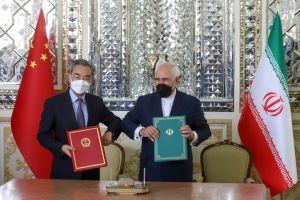Iranians Consider China Even More Important Than Regional Allies

A new poll shows Iranians recognize the economic and security benefits of a closer relationship with China.
China has significantly increased its involvement and cooperation with Iran. Last month, Iran and China signed a 25-year comprehensive economic and security agreement, similar to agreements China signed with Saudi Arabia and the United Arab Emirates. After signing the deal, Iranian Foreign Minister Mohammad Javad Zarif stated “China is a friend for hard times.” But Iranian critics point to a lack of transparency about the details of the agreement and the potential for Chinese exploitation of Iran’s resources. A joint survey conducted by the Chicago Council on Global Affairs and IranPoll suggests some Iranians may be hesitant about China’s growing influence in their country, but most recognize the economic opportunity and greater security guarantee that a closer relationship with China would entail.
Key Findings
- Iranians are more likely to say China is important to their country (83%) than they are to say their regional allies—Iraq (76%), Syria (74%), and Lebanon (68%)—are important.
- After Iran’s close allies, the next most important country to Iranians is Japan (57%), given the diplomatic and economic benefits Tokyo provides to Tehran.
- Amid heavy sanctions and a potential revival of the Joint Comprehensive Plan of Action (JCPOA), a majority of Iranians view the United States as important to Iran (54%).
- Iranians are split on whether Germany is important (49%) or unimportant (45%) to Iran.
- Fewer than half view France (42%), India (43%), or Saudi Arabia (38%) as important to Iran.
Iranians View China as Iran’s Most Important Ally
On March 27, Iran and China signed a 25-year, $400-billion agreement to increase Chinese investment in Iran while increasing Iranian oil exports to China. While some experts caution that the deal may be overhyped, it represents an invaluable lifeline to Iran, which has suffered severe economic contractions because of the United States’ sanctions—not to mention the impacts of the coronavirus pandemic.
Even before the announcement of this agreement, a February survey conducted by the Chicago Council on Global Affairs and IranPoll revealed that a large majority of Iranians believe China is an important influence on their country. Presented with a list of 10 countries and asked to rate their importance to Iran, Iranians conferred the most importance on China, with 83 percent describing it as either very important (46%) or somewhat important (37%). This rating is even higher than those given to Iran’s regional allies. Smaller majorities described Iraq (76%), Syria (74%), and Lebanon (68%) as important to Iran.
Countries Important to Iran
Here is a list of countries. Thinking about the role each of these countries plays in the world, how important is each one to Iran? (%)
February 8-28, 2021 | n = 1,006
Chicago Council Survey - IranPoll
While Iranians agree on China’s importance to their country, they divide on their feelings toward China. A University of Maryland-IranPoll survey from February 2021 revealed that Iranians are evenly divided between those who have a favorable (49%) and an unfavorable (50%) view of China.
Despite the tense political relations between Iran and the United States—or maybe because of them—a majority of Iranians (53%) said the United States is either very (31%) or somewhat (22%) important to Iran. At the same time, a plurality of Iranians responded that the United States is not important at all (35%), indicating there is a defiance among some against the influence the United States exerts on their country. Iranians seem even more disappointed in the European signatories to the JCPOA; only 4 in 10 Iranians say France and 5 in 10 Iranians say Germany are important to Iran.
However, Iranians are more unified in their disregard toward the United States. While more than half thought the United States is important to Iran, just 15 percent expressed a favorable view of the country, down from a high-water mark of 32 percent in 2016 (since this question was first asked in 2014). Iranians had a more positive view of the American people (45%, down from 53% in 2016).
Japan elicits slightly higher importance ratings (57%) than does the United States. Japan has maintained diplomatic relations with Iran over the last several decades and is one of Iran’s top trading partners, importing more than $1 billion in crude petroleum in 2019.3 Tokyo also plays an important role as a mediator between Iran and the United States—most recently as the Biden administration has sought to rejoin the JCPOA.
Not All Influence Is Positive
Iranians assess the world around them realistically. They value the strategic relationships their country has developed with regional partners, but they realize that cooperation with China can bring greater economic and international clout and make them feel less isolated internationally. At the same time, many Iranians seem wary of Beijing’s intentions.
The data also show that over the last few years, it has become clear that Washington has a unique power over Iran. In turning the spigot on and off by imposing and loosening sanctions, the United States has proven it can seriously impact the Iranian economy, no matter how much the Iranian public likes or dislikes the country or its people. This way of influencing affairs in Iran, however, does entail long-term costs for the United States, one of which may be the deepening of the strategic relationship between Tehran and Beijing.
Methodology
The Iranian part of the study was conducted as a part of IranPoll’s State of Iran Survey Series utilizing its standard nationally representative sampling from February 8 to 28, 2021, through telephone interviews with 1,006 Iranians. The sampling margin of error was +/- 3.09%. All interviews were monitored in real time by call-center supervisors. The samples were Random Digit Dialing (RDD) samples drawn from all landline telephones in Iran. The samples were stratified first by Iranian provinces and then in accordance with settlement size and type. All 31 Iranian provinces were represented in proportions similar to their actual populations, as were rural and urban areas. When a residence was reached, an adult was randomly selected from within that household using the random-table technique. An initial attempt and four callbacks (total of five attempts) were made in an effort to reach and complete an interview with the randomly selected respondents.
Further details of the methodology are at www.IranPoll.com/method and https://www.iranpoll.com/publications/ccga2.
About the Chicago Council on Global Affairs
The Chicago Council on Global Affairs is an independent, nonpartisan membership organization that provides insight—and influences the public discourse—on critical global issues. We convene leading global voices, conduct independent research, and engage the public to explore ideas that will shape our global future. The Council is committed to bringing clarity and offering solutions to issues that transcend borders and transform how people, business, and governments engage the world. Learn more at thechicagocouncil.org and follow @ChicagoCouncil.
About IranPoll
IranPoll® is an independent, full-service, opinion-research firm focusing exclusively on Iran. Believing in the scientific method, IranPoll provides its clients with tailored research services, evidence-led counsel, and a dispassionate understanding of the Iranian people that is based on empirical evidence and sound scientific methods. It is directed by Dr. Amir Farmanesh, an Iranian Canadian scholar with a doctoral degree from the University of Maryland School of Public Policy.
A division of People Analytics Inc. and operating from Toronto, Canada, IranPoll conducts research on Iranian public opinion using various modes of data collection, including telephone polling (including a monthly Omnibus), in-depth interviews, focus groups, and online panels (business-to-business and 51,000-member business-to-consumer).
IranPoll operates multiple polling call centers with 106 active calling stations and conducts over 160,000 interviews per year in Iran. Relying on scientific opinion research methods, IranPoll was able to provide a fully accurate prediction of the outcome of Iran’s May 2017 presidential election, which was published by the Economist before the initial official results were declared.
Complementing its extensive field capacity, IranPoll’s databank is the single most comprehensive databank of Iranian opinion polls, containing more than 3,000 questions on 430 topics and subtopics from more than 350 probability sample surveys conducted from 2006 to the present. Through its exclusive access to this databank, IranPoll provides its clients with evidence-based consultancy on issues relating to Iran and the Iranian people.
IranPoll is a member of the American Association for Public Opinion Research (AAPOR) and the World Association for Public Opinion Research (WAPOR) and follows their industry standards.



